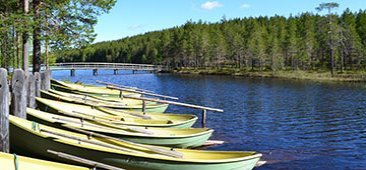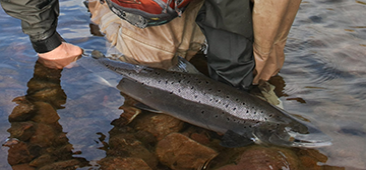Fishing
This summer, fishing attracted interest from people of all ages - revenues from fisheries management fees already EUR 10 million
Fri Sep 11 04:00:00 2020
The revenue from fisheries management fees earned this year exceeded EUR 10 million at the beginning of September. According to a Metsähallitus survey, the increase in revenues is the result of both an increase in the number of anglers and the higher payment activity of those who had previously fished.
By the beginning of September, there was a nearly 20% year-on-year gain in fisheries management fee revenues. Approximately 60% of the Metsähallitus survey respondents who paid the fisheries management fee for the first time reported that they had fished this year for the first time. Approximately half of these stated that an increase in leisure time was the motivation for starting a new hobby. Phenomena occurring during the nationwide state of emergency, such as the purchase of a summer cottage or boat, were often related to the first time fishing. About 20% of the respondents who paid the fisheries management fee for the first time said that they had used fishing methods that required the fisheries management fee in previous years.
Metsähallitus website traffic revealed that interest in paying the fisheries management fee increased this year in all age groups. The highest relative growth over last year can be seen at either extreme of the age range, i.e. those aged 55 or over and those aged 18-25.
“This summer, fishing has clearly brought Finns together. Children have got their parents to try fishing, and many have taken up their old hobby after years away from it. We were delighted to see that our message on the significance of the fisheries management fee also reached those who had previously fished without a permit,” says Jukka Bisi, Director of Wildlife Service Finland at Metsähallitus.
The fisheries management fee must be paid if you are 18 to 64 years of age and are fishing using a method other than ice fishing, hook and line fishing or fishing with a simple herring rig. To pay the fisheries management fee, you can go to Metsähallitus’ online shop at www.eraluvat.fi, use the Eräluvat app, call 020 69 2424, or go to an R kiosk or one of Metsähallitus’ visitor centres.
Metsähallitus collects the fisheries management fees and passes them on to the Ministry of Agriculture and Forestry. The Ministry and the ELY Centres allocate funds for the planning and sustainable development and management of fishing waters, monitoring of fishing activity, promotion of recreational fishing, advisory services for the fisheries sector, the activities of fisheries areas and compensation to water area owners.
For more information, visit eraluvat.fi
At the beginning of August, Metsähallitus conducted a survey among 75,615 anglers who paid the fisheries management fee in 2020. A total of 18,565 people responded to the survey, of which 1,121 reported that they had paid the fisheries management fee for the first time this year. Approximately 13% of those who paid the fisheries management fee by the beginning of August responded to the survey.
Further information:
Kirsi Suojoki, Senior Planning Officer, Metsähallitus kirsi.suojoki@metsa.fi, +358 (0)40 186 5875
Olli Urpanen, Senior Planning Officer, Metsähallitus, olli.urpanen@metsa.fi, +358 (0)206 39 5056
Ministry of Agriculture and Forestry
Metsähallitus, Wildlife Service Finland
Centres for Economic Development, Transport and the Environment (ELY Centres)
Natural Resources Institute Finland
Finnish Federation for Recreational Fishing
Federation of Finnish Fisheries Associations
Finland Inland Fishermen’s Association
Finnish Fishermen’s Association

Frequently asked questions about fishing
Where can I fish with a fisheries management fee? Where can I find information on fishing permits for privately-owned waters? When might it be necessary to pay compensation for the conservation value of an endangered fish species?

Responsible fishing
We want to encourage all fishers to consider the well-being of the fish. Each and every fisher is obligated to ensure the proper and respectful treatment of the fish they catch, regardless of whether they intend to release them or keep them for food.
